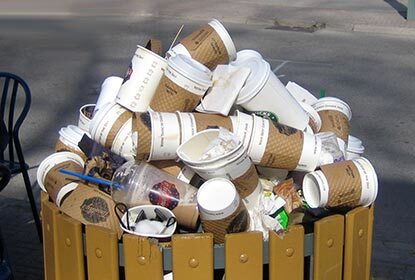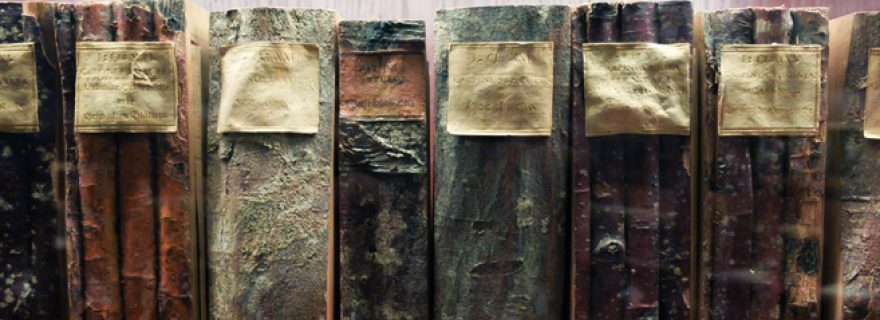The Green Academic
Plastic cups and bags, air travel, and conference goodies: some ethical dilemmas for researchers (and everybody else).
Sustainability, or more correctly: the lack of it, is the talk of the day. Unless you live in a social media bubble you probably have seen the turtle with a plastic straw, or the maps with global high temperatures flood your feed.
We all have given a thought to our relationship with resources and waste. But what about academics, do we have a greater responsibility towards sustainability?
Sustainability, what is it?
As a subject sustainability is very broad and extremely complex. Still, it can be neatly summarised by this definition: 'the development that meets the needs of the present without compromising the ability of future generations to meet their own needs'. (Brundtland Report, 1987)

What kind of monster would take away the future of this baby flamingo? Plameňák kubánský a mládě, Pavel Vlček, 2007, public domain.
Why should I care?
As inhabitants of planet Earth, we share with other humans the obligation to keep this place liveable. Yet I propose that us researchers have a greater responsibility because of our duty to advance knowledge. Since academics are close to centres of knowledge production, we cannot claim “we did not know” that our current system is unsustainable. Further, advancing knowledge will be hampered if others cannot meet their needs.
At the same time we are aware of how difficult and lengthy changing human behaviour patterns can be. Such knowledge obviously does not exclude us from the phenomena, before humanities scholars we are humans. This point only adds to the pledge: by taking our responsibility and discussing it with other people we can contribute towards change.
How can I care?
Sustainability involves many aspects of our lives: society, the environment, and the economy. As a concerned human that studies humanities, I want to share a few cases where us researchers can reduce our carbon foot-print. The examples below focus mainly on the environment and cover conferences, meetings, and field work such as a research stay.
Single-use items
Coffee cups, disposable cutlery and dishes, plastic or paper bags, etc. Whether in a conference or at a library, chances are you will use objects that have an environmental cost for production and are not easliy recyclable. The solution? Plan ahead.

In general consider the waste management situation at your destination and become aware of the objects you use and dispose. Instead of disposable cups you can buy a re-usable one and spare at least 3-4 paper-plastic cups per day. There are also re-usable options for other items such as camping cutlery, metal straws, bring-your-own chopsticks, cotton bags, and bee-wax cloths.
In my last long-stay research in a Mexican archive I spared at least 100 cups, +/- 60 plastic bags, 60 paper bags, 20 sets of plastic cutlery (some restaurants do not have metal ones), and 60 plastic bottles.

When is too much landfill too much? Open landfill site on top of the hill - Koh Tao (Thailand), Myat T. Aung, 2013, CC BY-SA 4.0 Deed.
There is an on-going discussion on reduction of waste vs the costs of re-usable items. On the long term, re-usable objects are better when used for long periods and if one is mindful of the washing. I personally add some water on my coffee cup, shake it, drink it and serve coffee again, washing it only once a day. Flash news: I am not dead nor sick.
The issue of green consumerism is another consideration that should be made. One does not need to buy “green” things, there are also DIY options. The focus should be on reuse and reduce waste.

Some re-usable items for conferences, research stays, and life in general. Before buying something new, check if you don't have something already at home, Andrea Reyes Elizondo 2018, personal archive, CC BY-NC-SA 4.0.
Travel & transportation
According to Leiden University regulations, researchers must travel by train whenever possible. The occasions that require air travel can be optimised by combining them with other activities. For example you can extend a conference trip for research or combine it with holidays. The goal should be to travel as little as possible.
Needless to say, at the destination we should strive to use public transport. This is not always easy nor comfortable. For example, when in Mexico City working at archives I need to carry equipment. Using public transportation is not as comfortable as taking a cab plus it takes more time and more walking. I will not lie and say the decision comes easily, it is a daunting task to fight oneself when comfort is involved.

Rush hour in the metro carryng a heavy back pack: not my dream. Esperando #urbanjungle, Vladimir Cortés Roshdestvensky, 2016, CC BY-NC-SA 2.0 Deed.
Mindful about waste
Besides avoiding single-use items we should mind the kind of waste that we generate and where do we leave it. For example, cigarette butts are toxic and damaging to waterways. If you smoke, consider carrying a portable ashtray.
Same goes for wrappings, tissues, or garbage in general. Sometimes there are not enough trash bins and thus litter flies away. Since the Aum Shinrikyo terrorist attacks there are few public trash bins in Japan, so people carry their wrappings until they find a bin. This might sound discomforting. As Don DeLillo described it: our garbage must disappear in the Underworld. But perhaps by not disposing our garbage immediately we can become more aware of our waste.

Trash bin with a recycle logo, very eco-friendly. Waste bins overflowing on the National Mall, during the United States federal government shutdown of 2013, DrTorstenHenning, 2013, CC0 1.0 Deed
Academic events
At one point or another you will be involved in organising an event in the university. Besides avoiding single-use items there are two other wasteful things we can target: goodies and balloons.
Conference goodies are to academics what souvenirs are for Mexicans. After holidays you must bring something to your family and friends. Similarly, it is expected that attendees must get bags, notebooks, pens, and worse: USB sticks. Some items are useful, most are thrown away immediately, and others pile up in a drawer. Even worse is the accumulation of these items: every conference means more production and waste.

How many USBs does an academic need? Free USBs, Andrea Reyes Elizondo 2018, personal archive, CC BY-NC-SA 4.0.
Balloons are other objects we should stop using right now. Universities often use them for welcoming new students or to give a joyful tone to some events. Sadly, the joy is short-lived while the effects are nasty and last too long (even the “biodegradable” ones).

Balloons at TU Delft & Leiden University, Promotional balloons at universities Open Days Andrea Reyes Elizondo 2018, personal archive, CC BY-NC-SA 4.0.
If you are on an organising committee, please consider raising these matters. We are getting together to discuss topics and findings, not to litter.
But...
“... what benefit do my individual actions have?” You have a point, any action will be limited by the system. Yet, this does not nullify our responsibility.
We know things need to change at all levels, yet knowing is not enough. For Paulo Freire, “To exist, humanly, is to name the world, to change it.” This naming requires knowledge and reflection but also action. Simply reflecting will not do. I invite you to reflect on your footprint as an academic and act upon it, both at individual and systemic levels.
Pictures & notes
Banner image: Schildbachsche Holzbibliothek at Kassel, photo by the author. (CC BY-NC-SA 2.0)
Baby flamingo photo: Pavel Vlček, Zoo Ostrava (public domain)
Landfill photo: Myat T. Aung (CC BY-SA 4.0)
CDMX metro photo: Vladimir Cortés Roshdestvensky (CC BY-NC-SA 2.0)
USBs & re-usable objects: photo by the author (CC BY-NC-SA 2.0)
Freire's quote from Nitsch, U. (1997). The reluctant scientist. In A. Nordgren (Ed.), Science, ethics, sustainability. Acta Universitas Upsaliensis, Studies in Bioethics and Research Ethics, 2, 189–203.
© Andrea Reyes Elizondo and Leiden Arts in Society Blog, 2018. Unauthorised use and/or duplication of this material without express and written permission from this site’s author and/or owner is strictly prohibited. Excerpts and links may be used, provided that full and clear credit is given to Andrea Reyes Elizondo and Leiden Arts in Society Blog with appropriate and specific direction to the original content.



0 Comments